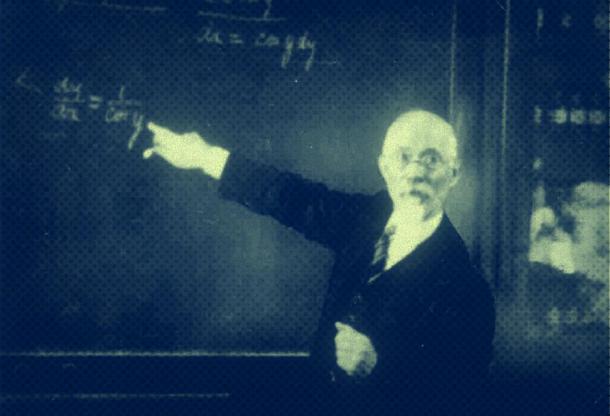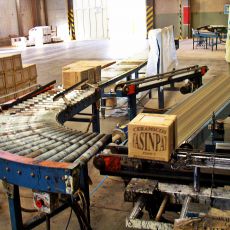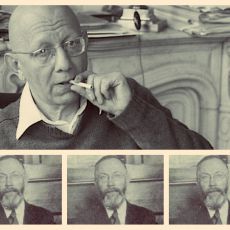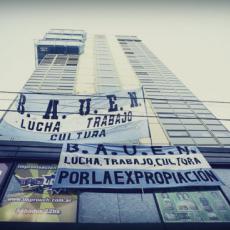Council Organisation
Excerpt from the book “Workers' Councils”
The social system considered here might be called a form of communism, only that name, by the world-wide propaganda of the "Communist Party" is used for its system of State socialism under party dictatorship. But what is a name? Names are ever misused to fool the masses, the familiar sounds preventing them from critically using their brains and clearly recognizing reality. More expedient, therefore, than looking for the right name will it be to examine more closely the chief characteristic of the system, the council organization.
The Workers' Councils are the form of self-government which in the times to come will replace the forms of government of the old world. Of course not for all future; none such form is for eternity. When life and work in community are natural habit, when mankind entirely controls its own life, necessity gives way to freedom and the strict rules of justice established before dissolve into spontaneous behavior. Workers' councils are the form of organization during the transition period in which the working class is fighting for dominance, is destroying capitalism and is organizing social production. In order to know their true character it will be expedient to compare them with the existing forms of organization and government as fixed by custom as self-evident in the minds of the people.
Communities too large to assemble in one meeting always regulate their affairs by means of representatives, of delegates. So the burgesses of free medieval towns governed themselves by town councils, and the middle class of all modern countries, following the example of England, have their Parliaments. When speaking of management of affairs by chosen delegates we always think of parliaments; so it is with parliaments especially that we have to compare the workers' councils in order to discern their predominant features. It stands to reason that with the large differences between the classes and between their aims, also their representative bodies must be essentially different.
At once this difference strikes the eye: Workers' councils deal with labor, have to regulate production, whereas parliaments are political bodies, discussing and deciding laws and State affairs. Politics and economy, however, are not entirely unrelated fields. Under capitalism State and Parliament took the measures and enacted the laws needed for the smooth course of production; such as the providing for safety in traffic and dealings, for protection of commerce and industry, of business and travel at home and abroad, for administration of justice, for coinage and uniform weights and measures. And its political work, too, not at first sight connected with economic activity, dealt with general conditions in society, with the relations between the different classes, constituting the foundation of the system of production. So politics, the activity of Parliaments may, in a wider sense, be called an auxiliary for production.
What, then, under capitalism, is the distinction between politics and economy? They compare together as the general regulation compares with the actual practice. The task of politics is to establish the social and legal conditions under which productive work may run smoothly; the productive work itself is the task of the citizens. Thus there is a division of labor. The general regulations, though necessary foundations, constitute only a minor part of social activity, accessory to the work proper, and can be left to a minority of ruling politicians. The productive work itself, basis and content of social life, consists in the separate activities of numerous producers, completely filling their lives. The essential part of social activity is the personal task. If everybody takes care of his own business and performs his task well, society as a whole runs well. Now and then, at regular intervals, on the days of parliamentary election, the citizens have to pay attention to the general regulations. Only in times of social crisis, of fundamental decisions and severe contests, of civil strife and revolution, has the mass of the citizens had to devote their entire time and forces to these general regulations. Once the fundamentals decided, they could return to their private business and once more leave these general affairs to the minority of experts, to lawyers and politicians, to Parliament and Government.
Entirely different is the organization of common production by means of workers' councils. Social production is not divided up into a number of separate enterprises each the restricted life-task of one person or group; now it forms one connected entirety, object of care for the entirety of workers, occupying their minds as the common task of all. The general regulation is not an accessory matter, left to a small group of specialists; it is the principal matter, demanding the attention of all in conjunction. There is no separation between politics and economy as life activities of a body of specialists and of the bulk of producers. For the one community of producers politics and economy have now coalesced into the unity of general regulation and practical productive labor. Their entirety is the essential object for all.
This character is reflected in the practice of all proceedings. The councils are no politicians, no government. They are messengers, carrying and interchanging the opinions, the intentions, the will of the groups of workers. Not, indeed, as indifferent messenger boys passively carrying letters or messages of which they themselves know nothing. They took part in the discussions, they stood out as spirited spokesmen of the prevailing opinions. So now, as delegates of the group, they are not only able to defend them in the council meeting, but at the same time they are sufficiently unbiased to be accessible to other arguments and to report to their group opinions more largely adhered to. Thus they are the organs of social intercourse and discussion.
The practice of parliaments is exactly the contrary. Here the delegates have to decide without asking instructions from their voters, without binding mandate. Though the M.P., to keep their allegiance, may deign to speak to them and to expound his line of conduct, he does so as the master of his own deeds. He votes as honor and conscience dictate him, according to his own opinions. Of course; for he is the expert in politics, the specialist in legislative matters and cannot let himself be directed by instructions from ignorant people. Their task is production, private business, his task is politics, the general regulations. He has to be guided by high political principles and must not be influenced by the narrow selfishness of their private interests. In this way it is made possible that in democratic capitalism politicians, elected by a majority of workers, can serve the interests of the capitalist class.
In the labor movement also the principles of parliamentarism took a footing. In the mass organizations of the unions, or in such gigantic political organizations as the German Social-Democratic Party, the officials on the boards as a kind of government got power over the members, and their annual congresses assumed the character of parliaments. The leaders proudly called them so, parliaments of labor, to emphasize their importance; and critical observers pointed to the strife of factions, to the demagogy of leaders, and to the intrigue behind the scenes as indications of the same degeneration as appeared in the real parliaments. Indeed, they were parliaments in their fundamental character. Not in the beginning, when the unions were small, and devoted members did all the work themselves, mostly gratuitously. But with the increase of membership there came the same division of labor as in society at large. The working masses had to give all their attention to their separate personal interests, how to find and keep their job, the chief contents of their life and their mind; only in a most general way they had, moreover, to decide by vote over their common class and group interests. It was to the experts, the union officials and party leaders, who knew how to deal with capitalist bosses and State secretaries, that the detailed practice was left. And only a minority of local leaders was sufficiently acquainted with these general interests to be sent as delegates to the congresses, where notwithstanding the often binding mandates, they actually had to vote after their own judgment.
In the council organization the dominance of delegates over the constituents has disappeared because its basis, the division of labor, has disappeared. Now the social organization of labor compels every worker to give his entire attention to the common cause, the totality of production. The production of the necessaries for life as the basis of life, as before entirely occupies the mind. Not in the form, now, as care for the own enterprise, the own job, in competition with others. Life and production now can be secured only by collaboration, by collective work with the companions. So this collective work is uppermost in the thoughts of everybody. Consciousness of community is the background, the basis of all feeling and thinking.
This means a total revolution in the spiritual life of man. He has now learnt to see society, to know community. In former times, under capitalism, his view was concentrated on the small part related with his business, his job, himself and his family. This was imperative, for his life, his existence. As a dim, unknown background society hovered behind his small visible world. To be sure, he experienced its mighty forces that determined luck or failure as the outcome of his labor; but guided by religion he saw them as the working of supernatural Supreme Powers. Now, on the contrary, society comes into the full light, transparent and knowable; now the structure of the social process of labor lies open before man's eyes. Now his view is directed to the entirety of production; this is imperative, for his life, his existence. Social production is now the object of conscious regulation. Society is now a thing handled, manipulated by man, hence understood in its essential character. Thus the world of the workers' councils transforms the mind.
To parliamentarism, the political system of the separate business, the people were a multitude of separate persons; at the best, in democratic theory, each proclaimed to be endowed with the same natural rights. For the election of delegates they were grouped according to residence in constituencies. In the times of petty-capitalism a certain community of interests might be assumed for neighbors living in the same town or village. In later capitalism this assumption ever more became a fiction. Artisans, shopkeepers, capitalists, workers living in the same quarter of a town have different and opposed interests; they usually give their vote to different parties, and chance majorities win. Though parliamentary theory considers the man elected as the representative of the constituency, it is clear that all these voters do not belong together as a group that sends him as its delegate to represent its wishes.
Council organization, in this respect, is quite the contrary of parliamentarism. Here the natural groups, the collaborating workers, the personnels of the factories act as unities and designate their delegates. Because they have common interests and belong together in the praxis of daily life, they can send some of them as real representatives and spokesmen. Complete democracy is realized here by the equal rights of everyone who takes part in the work. Of course, whoever stands outside the work does not have a voice in its regulation. It cannot be deemed a lack of democracy that in this world of self-rule of the collaborating groups all that have no concern with the work—such as remained in plenty from capitalism: exploiters, parasites, rentiers—do not take part in the decisions.
Seventy years ago Marx pointed out that between the rule of capitalism and the final organization of a free humanity there will be a time of transition in which the working class is master of society but in which the bourgeoisie has not yet disappeared. He called this state of things the dictatorship of the proletariat. At that time this word had not yet the ominous sound of modern systems of despotism, nor could it be misused for the dictatorship of a ruling party, as in later Russia. It meant simply that the dominant power over society was transferred from the capitalist to the working class. Afterwards people, entirely confined within the ideas of parliamentarism, tried to materialize this conception by taking away the franchise for political bodies from the propertied classes. It is clear that, violating as it did the instinctive feeling of equal rights, it was in contrast to democracy. We see now that council organization puts into practice what Marx theoretically anticipated but for what at that time the practical form could not yet be imagined. When production is regulated by the producers themselves, the formerly exploiting class automatically is excluded from taking part in the decisions, without any artificial stipulation. Marx's conception of the dictatorship of the proletariat now appears to be identical with the labor democracy of council organization.
This labor democracy is entirely different from political democracy of the former social system. The so-called political democracy under capitalism was a mock democracy, an artful system conceived to mask the real domination of the people by a ruling minority. Council organization is a real democracy, the democracy of labor, making the working people master of their work. Under council organization political democracy has disappeared, because politics itself disappeared and gave way to social economy. The activity of the councils, put in action by the workers as the organs of collaboration, guided by perpetual study and strained attention to circumstances and needs, covers the entire field of society. All measures are taken in constant intercourse, by deliberation in the councils and discussion in the groups and the shops, by actions in the shops and decisions in the councils. What is done under such conditions could never be commanded from above and proclaimed by the will of a government. It proceeds from the common will of all concerned; because it is founded on the labor experience and knowledge of all, and because it deeply influences the life of all. Measures can be executed only in such a way that the masses put them into practice as their own resolve and will; foreign constraint cannot enforce them, simply because such a force is lacking. The councils are no government; not even the most central councils bear a governmental character. For they have no means to impose their will upon the masses; they have no organs of power. All social power is vested in the hands of the workers themselves. Wherever the use of power is needed, against disturbances or attacks upon the existing order, it proceeds from the collectivities of the workers in the shops and stands under their control.
Governments were necessary, during the entire period of civilization up to now, as instruments of the ruling class to keep down the exploited masses. They also assumed administrative functions in increasing measure; but their chief character as power structures was determined by the necessity of upholding class domination. Now that the necessity has vanished, the instrument, too, has disappeared. What remains is administration, one of the many kinds of work, the task of special kinds of workers; what comes in its stead, the life spirit of organization, is the constant deliberation of the workers, in common thinking attending to their common cause. What enforces the accomplishment of the decisions of the councils is their moral authority. But moral authority in such a society has a more stringent power than any command or constraint from a government.
When in the preceding time of governments over the people political power had to be conceded to the people and their parliaments a separation was made between the legislative and the executive part of government, sometimes completed by the judicial as a third independent power. Law-making was the task of parliaments, but the application, the execution, the daily governing was reserved to a small privileged group of rulers. In the labor community of the new society this distinction has disappeared. Deciding and performing are intimately connected; those who have to do the work have to decide, and what they decide in common they themselves have to execute in common. In the case of great masses, the councils are their organs of deciding. Where the executive task was entrusted to central bodies these must have the power of command, they must be governments; where the executive task falls to the masses themselves this character is lacking in the councils. Moreover, according to the varied problems and objects of regulation and decision, different persons in different combinations will be sent out and gather. In the field of production itself every plant has not only to organize carefully its own extensive range of activities, it has also to connect itself horizontally with similar enterprises, vertically with those who provide them with materials or use their products. In the mutual dependence and interconnection of enterprises, in their conjunction to branches of production, discussing and deciding councils will cover ever wider realms, up to the central organization of the entire production. On the other hand the organization of consumption, the distribution of all necessaries to the consumer, will need its own councils of delegates of all involved, and will have a more local or regional character.
Besides this organization of the material life of mankind there is the wide realm of cultural activities, and of those not directly productive which are of primary necessity for society, such as education of the children, or care for the health of all. Here the same principle holds, the principle of self-regulation of these fields of work by those who do the work. It seems altogether natural that in the care for universal health, as well as in the organization of education, all who take part actively, here the physicians, there the teachers, by means of their associations regulate and organize the entire service. Under capitalism, where they had to make a job and a living out of the human disease or out of drilling children, their connection with society at large had the form either of competitive business or of regulation and command by Government. In the new society, in consequence of the much more intimate connection of health with labor, and of education with labor, they will regulate their tasks in close touch and steady collaboration of their organs of intercourse, their councils, with the other workers' councils.
It must be remarked here that cultural life, the domain of arts and sciences; by its very nature is so intimately bound up with individual inclination and effort, that only the free initiative of people not pressed down by the weight of incessant toil can secure its flowering. This truth is not refuted by the fact that during the past centuries of class society princes and governments protected and directed arts and sciences, aiming of course to use them as utensils for their glory and the preservation of their domination. Generally speaking, there is a fundamental disparity for the cultural as well as for all the non-productive and productive activities, between organization imposed from above by a ruling body and organization by the free collaboration of colleagues and comrades. Centrally directed organization consists in regulation as much as possible uniform all over the realm; else it could not be surveyed and conducted from one centre. In the self-regulation by all concerned the initiative of numerous experts, all poring over their work, perfecting it by emulating, imitating, consulting each other in constant intercourse, must result in a rich diversity of ways and means. Dependent on the central command of a government, spiritual life must fall into dull monotony; inspired by the free spontaneity of massal human impulse it must unfold into brilliant variety. The council principle affords the possibility of finding the appropriate forms of organization.
Thus council organization weaves a variegated net of collaborating bodies through society, regulating its life and progress according to their own free initiative. And all that in the councils is discussed and decided draws its actual power from the understanding, the will, the action of working mankind itself.






Σχόλια
Υποβολή νέου σχολίου